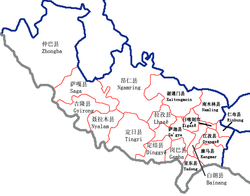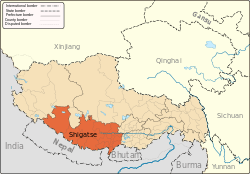Namling County
| Namling County 南木林县 • རྣམ་གླིང་རྫོང་། | |
|---|---|
| County | |
 | |
.png) Location of Namling County within Tibet | |
 Namling County Location in Tibet | |
| Coordinates: 29°53′07″N 89°26′10″E / 29.88528°N 89.43611°E | |
| Country | China |
| Province | Tibet |
| Prefecture-level city | Xigazê |
| Time zone | China Standard (UTC+8) |
Namling County (Chinese: 南木林县; Pinyin: Nánmùlín Xiàn) is a county of Xigazê in the Tibet Autonomous Region.
Geography
Namling is the current administrative name given to the valleys of Oyuk, Tobgyet, and Shang ... [associated]... with both Buddhism and Bon. Through these valleys respectively flow the 'Nang-gung-chu'mang ra chu Tobpu-chu, and Shang-chu rivers, with their various tributaries, which rise amid the southern slopes of the Nyenchen Tanglha range to the north, and flow southwards to converge with the Brahmaputra [called the Yarlung Tsangpo River in Tibet].[1]
The lower reaches of the Yarlung Tsangpo River make "a sharp U-turn around Namjagbarwa Peak in Pai, Namling County." This is regarded as the starting point of the Yarlung Tsangpo Grand Canyon in Nyingchi Prefecture, which stretches 496 kilometres (308 mi) and averages over 5,000 metres (3.1 mi) in depth.[2] The county has three geysers.[3]
Town and townships
- Namling Town (རྣམ་གླིང་, 南木林镇)
- Car Township (ཚར་, 查尔乡)
- Dagna Township (སྟག་སྣ་, 达那乡)
- Doqoi Township (མདོ་མཆོད་, 多角乡)
- Êma Township (ཡེ་མ་, 艾玛乡)
- Gyamco Township (རྒྱ་མཚོ་, 甲措乡)
- Karzê Township (མཁར་རྩེ་, 卡孜乡)
- Lhabupu Township (ལྷ་བུ་ཕུ་, 拉布普乡)
- Mangra Township (མང་ར་, 芒热乡)
- Numa Township (ནུ་མ་, 奴玛乡)
- Putang Township (ཕུ་ཐང་, 普当乡)
- Dakce Township (སྟག་རྩེ་, 达孜乡)
- Qum Township (ཆུམ་, 秋木乡)
- Ratang Township (ར་ཐང་, 热当乡)
- Rindü Township (རིན་འདུས་, 仁堆乡)
- Sogqên Township (སོག་ཆེན་, 索金乡)
- Tobgyai Township (ཐོབ་རྒྱལ་, 土布加乡)
Development efforts
The Namling County Schools Project was founded by Tashi Tsering in 1991, and has been sponsored by the Boulder-Lhasa Sister City Project (BLSCP) since 1994. As of 2013, it supports 53 rural elementary schools.[4][5][6]
As of 2006, 15 out of the county's 17 towns had cell phone service.[7]
As of 2001, potatoes have been introduced in Aimagang (Emagang) as a crop for herdsmen in the county.[8] Potatoes and vegetables were shipped to markets in Xigazê, and production of peas and wheat decreased.[9][10]
The 2009 HIV/AIDS outreach efforts in rural areas of the county appear to have had a positive impact in comparison to a similar non-intervention area of Tingri County, according to Medicus Mundi Switzerland.[11][12]
In 2010, protests of environmental damage by gold mining resulted in arrests and at least one fatality.[13][14]
In 2011, Qin Weiqiang, secretary of the Namling County Party Committee, said that after the "Lhasa–Xigazê Railway is put into operation", the number of tourists in Namling County was expected to increase.[15]
Culture
"The famous local specialities are silver utensils, Tibetan sword and so on. Namling Town is the office place of Namling with a population 5,000, where are many monasteries."[16]
Traditional Tibetan opera is popular in Namling County, and government funding efforts to preserve the tradition were started in 2005.[17] "Xiangba Tibetan play in Namling County of Tibet has a history of more than 700 years. It is one of the four major schools of the blue-mask Tibetan play, and was born in the late 18th century."[18] Local residents preserve "some traditional Tibetan operas such as "Princess Wencheng", "Chimei Gongdan", "Langsa Wenbo" and so on."[19] "Tongdong Gyaibo (1365-1455), the founder of Tibet Opera, was born in Ngamring County. Legend has it that the iron chain bridge over the Xiongqoi River in Namling County was built with funds collected by Tongdong Gyaibo through performances."[20]
Namling County and the Xiangqu River Basin were a cultural center of the Supi tribe, known as "The Kingdom of Women", and "one of the earliest tribes in Tibet." After "the end of the sixth century, the Supi tribe moved its political center to the Lhasa River Basin."[15]
As of 1999, the county was home to the critically endangered Golden-headed box turtle (Cuora aurocapitata).[21]
Monasteries
Yungdrungling Monastery "is located at the foot of the Yulha Jiesam mountain in the Numa village in Namling County about 90 km. from Xigazê. The monastery is surrounded by dense wood ... it is one of the four major monasteries of Bon religion in Tibet."[22]
Danag Monastery, over 800 years old, is located in Danag Village.[23]
The remains of the Dingma Monastery, an 11th-century Kadampa monastery, are located on a hill in the Oyuk Valley. It was founded by Ram Dingma Deshek Jungne, a student of Geshe Potowa.[1]
The Gongon Lhakhang temple, in Oyuk Township, was said to be built by Songtsen Gampo, and frequented by Padmasambhava and his students Namkhai Nyingpo and King Trisong Detsen in the 8th century.[1]
Oyuk Chigong or Oyuk Jara Gon is a hermitage located at Jarasa in lower Oyuk. It is "the abode or castle of the protector deity Dorje Lekpa: guardian of the Dzogchen teachings."[1]
The Gelukpa monasteries of Drungzhi and Sogchen are located in the Tobgyel Valley.[1]
Gadan Chiokorling Monastery, located 1 km from the county center, originally called Gegon Songrapling Monastery, became part of the Gelgupa Sect during the reign of the 5th Dalai Lama.[24]
Notable people
- Mokchokpa Rinchen Tsondrü (1110-1170?) of the Shangpa Kagyu was born in the Lhabu grasslands of the county's Shang Valley.[25]
- Lobsang Yeshe, Fifth Panchen Lama (1663–1737) was born in Namling County.[26]
- Tenpai Wangchuk, 8th Panchen Lama (1855–1882) was born in Namling County.
- Guisang Sang (b. appx. 1958), who joined the Tibet Mountaineering Team in 1982, was the first woman in Asia to reach the top of Mount Everest twice.[27][28]
- Tashi Tsering (educator) (1929-2014)
References
- 1 2 3 4 5 "Namling County". TibetMaster.com. Retrieved 2013-10-19.
- ↑ "A river´s bend -- Trip to Yarlung Zangpo Canyon". CCTV-International. Retrieved 2013-10-19.
- ↑ Mingzhen, Sun (1984). "Geothermal Energy Lights Up Tibet". Beijing Review (No. 35). p. 28. Retrieved 2013-10-19.
- ↑ "Namling County Schools Project". Boulder-Lhasa Sister City Project. Retrieved 2013-10-19.
- ↑ Siebenschuh, William R. (2003). The struggle for education in modern Tibet: the three thousand children of Tashi Tsering. Lewiston, NY: E. Mellen Press. ISBN 0773465790.
- ↑ Goldstein, Melvyn C. (1997). The struggle for modern Tibet: the autobiography of Tashi Tsering. Armonk, N.Y: M.E. Sharpe. ISBN 1563249502.
- ↑ "Tibetan farmers' wireless phone". www.gov.cn/english. Retrieved 2013-10-19.
- ↑ "Planting potato benefits herdsmen in Namling". Chinatibetnews.com. August 2009. Retrieved 2013-10-19.
- ↑ "Special Economy in the Xigaze Area - Namling Potatoes". China's Tibet. Retrieved 2013-10-19.
- ↑ "Shigatse develops distinctive products". China Tibet Online. Retrieved 2013-10-19.
- ↑ Christofori, Monika; Sybille N’Zebo (September 2011). "Join in circuit on AIDS, love and sexuality". Bulletin of Medicus Mundi Switzerland (121). Retrieved 2013-10-19.
- ↑ "HIV Market evaluation - executive summary" (PDF), Swiss Red Cross 2011 Delegation to Tibet, retrieved 2013-10-19
- ↑ "China says only one Tibetan shot dead in Palyul mine protest". www.phayul.com. Retrieved 2013-10-19.
- ↑ "Tibetans severely beaten and held for opposing rampant mining". Tibetan Review. Retrieved 2013-10-19.
- 1 2 "Namling County travel notes: Xiangba Culture and "Kingdom of Women"". CCTV News - CNTV English. Retrieved 2013-10-19.
- ↑ "Namling County". China Tibet Information Center. Retrieved 2013-10-19.
- ↑ "Tibet earmarks fund to preserve traditional opera". ChinaCulture.org. Retrieved 2013-10-19.
- ↑ "School 3: Xiangba School in Namling County, Xigaze". Cultural China. Retrieved 2013-10-19.
- ↑ "Xiangba Tibetan opera in Namling". China Tibet Information Center. Retrieved 2013-10-19.
- ↑ "Xigaze". China Tibet Information Center. Retrieved 2013-10-19.
- ↑ "Asian Box Turtles (Cuora spp.)" (PDF), Pro Wildlife, retrieved 2013-10-19
- ↑ "Rala Yungdrungling monastery, (near) Rela, Xizang, CN". Mapping Buddhist Monasteries. Retrieved 2013-10-19.
- ↑ "Mapping work of Danag Monastery completed". People's Daily Online. 2010-01-25. Retrieved 2013-10-19.
- ↑ "3-day Tibet Shigatse Hiking to Visit Temples". Travel China Guide. Retrieved 2013-10-19.
- ↑ "Mokchokpa Rinchen Tsondrü". Rangjung Yeshe Wiki - Dharma Dictionnary. Retrieved 2013-10-19.
- ↑ Aiming, Zhou. "中国西藏". Ctibet.org. Retrieved 2013-10-19.
- ↑ "August 1-10th 1999 Daily Reports". Everest News. Retrieved 2013-10-19.
- ↑ "Tibetan women on top of the world". China Daily. 2004-03-08. Retrieved 2013-10-19.
External links
Coordinates: 29°53′07″N 89°26′10″E / 29.88528°N 89.43611°E
